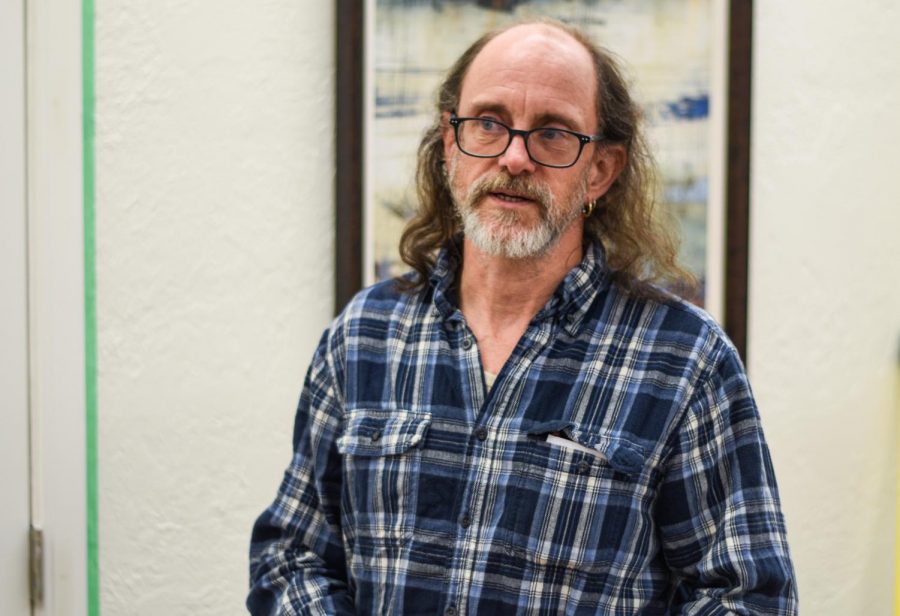Latah Recovery Center adds new crisis facility
Patients can stay less than 24 hours; facility staffing based on need
Shawn Hogan, interim Crisis Center coordinator, provides details about the opening of the Moscow Crisis Center and the kind of services that will be available during an interview on Monday at Latah Recovery Center Moscow.
October 23, 2019
Moscow will add a crisis center to the Latah Recovery Center that will be opening before the end of the month.
Shawn Hogan, interim crisis center coordinator, said they are in the final phase of construction which is mainly painting and finishing up city inspections. They do not have an official open date but they plan to be open sometime next week, he said.
Joyce Lyons, Latah Crisis Center project manager, said Idaho Public Health partnered with the Latah Recovery Center to provide the physical location and intake services. The treatment agency, that is contracted, does the patient assessment and provides medical services.
The Latah Crisis Center will be a 24-hour center where patients can check themselves in for up to 23 hours and 59 minutes.
However, if a patient feels they are still experiencing a crisis then they can reapply for another session, Hogan said.
“[The crisis center] is for those needing a ‘time-out’ before having a serious crisis,” Hogan said.
The center will be staffed on a need basis to avoid overusing their budget to pay wages for professional staff such as nurses and counselors, Hogan said. The professional staff that treats patients will be paid through the grants supplied by Idaho Public Health, Lyons said.
They will have a 1-800 number that those experiencing a crisis can call, which will dispatch on-call staff to the center, she said. Once a call is dispatched two clinicians, one case manager and one security personnel, all local, will be sent onsite to provide treatment for the patient, Lyons said.
The intake process is designed to keep the patient and staff safe: they are patted down, asked to dispose of contraband items, assessed for medical and mental stability and then admitted into the crisis center, Hogan said.
“We are not a homeless shelter or detox facility,” he said. They are strictly a crisis center where patients voluntarily check-in and stay but patients can also be brought in by law enforcement.
Hogan said the center is a clinical entity but will use resources from the Recovery Center that are available to them.
The Latah Recovery Center has various groups that patients can join for long term support, he said. Groups offered by the center include Alcoholics Anonymous and Life Skills, according to its website.
The center is a few blocks from Gritman Medical Center, so patients can also be transported there if they need medical services, he said. For behavioral health services, they will most likely be sent to the inpatient center at Saint Joseph Regional Medical Center.
Hogan said the center is making plans to have agreements with local law enforcement and emergency medical technicians.
Loren Brown, associate director of counseling and psychological services at Cougar Health Services, said they were not aware of the crisis center opening but he hopes there will be future collaboration.
CHS currently has a hotline for students to contact if they feel they are experiencing a crisis, he said. The hotline is answered by counselors who can help calm or provide support for students.
The hotline is available from 5 p.m. to 8 a.m. Monday through Friday and all day on weekends and WSU holidays, he said.
After the session, students can attend in-person counseling at CHS or contact a counselor in the community if they have outside insurance, Brown said. The police can also be contacted if students feel they are in danger of hurting themselves or others.
Lyons said they have reached out to the University of Idaho and their student health services to serve students at the crisis center. She said she does regard WSU and U of I as one community, but the center is funded by the state of Idaho for its residents.
“We’re really not going to send somebody away if they come in crisis if they don’t happen to live in Idaho,” Lyons said.
The center is not opposed to servicing WSU students, but she worries about the budget if many Washington residents are using the center. If it gets to that point, she said she hopes WSU would help fund the center.

















